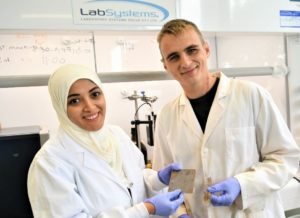Waste cooking oil, sulfur and wool offcuts have been put to good use by green chemists at Flinders University to produce a sustainable new kind of housing insulation material.
The latest environmentally friendly building product from experts at the Flinders Chalker Lab and colleagues at Deakin and Liverpool University, has been described in a new paper published in Chemistry Europe ahead of Global Recycling Day (18 March 2021).

The insulating composite was made from the sustainable building blocks of wool fires, sulfur, and canola oil to produce a promising new model for next-generation insulation - not only capitalising on wool's natural low flammability but also to make significant energy savings for property owners and tenants.
The new composite is one of several exciting new composites and polysulfide polymers made from waste products that are now being commercialised, says lead author Associate Professor Justin Chalker, the New Innovators winner in the 2020 Prime Minister's Prizes for Science.
"The aim of this new study was to evaluate a composite made from sulfur, canola oil, and wool as thermal insulation. The material is prepared by hot pressing raw wool with a polymer made from sulfur and canola oil," Associate Professor Chalker says.






